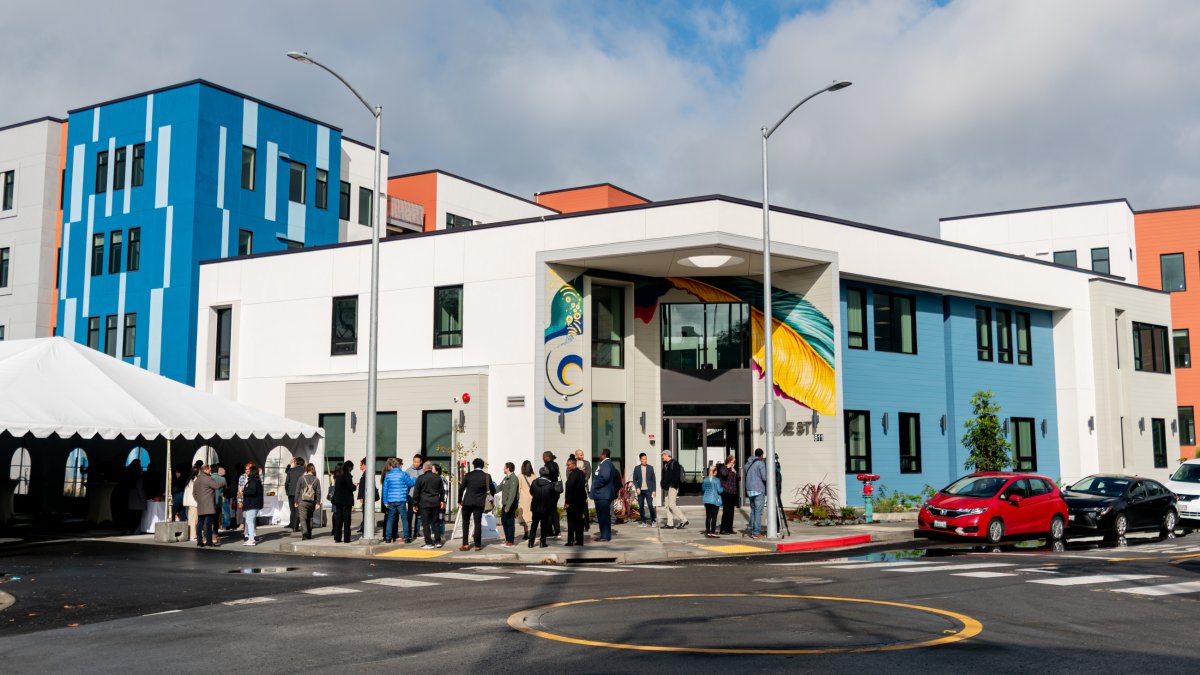A new West Oakland apartment complex was celebrated by local officials and community members Thursday with the hope that it will help provide affordable housing for low-income individuals and people transitioning from homelessness.
The Phoenix is one of Oakland’s newest apartment complexes in the Prescott neighborhood, built by the East Bay Asian Local Development Corporation and Abode Housing Development for around $60 million with 100 affordable units and a multitude of residential services that promise to help low-income residents keep a roof over their heads.
Oakland Mayor Barbara Lee spoke at the opening ceremony to speak about the importance of the project for addressing chronic homelessness issues in the city.
“The Phoenix represents 100 new homes for Oakland families who deserve to stay rooted in the community that they love,” said Lee. “Affordable housing is about justice. It’s about keeping our teachers, nurses, small business owners, families, low-income families, and people who deserve to have a home.”
The Phoenix will have units below at least 60% of the area median income, a standard set by the state of California and determined by the city of Oakland. Half of the units will be dedicated to housing for people exiting homelessness and on-site resources will assist them in ensuring they remain in stable housing.
The project used funds from state, local and private partners totaling $60 million over the course of several years. It will continue to receive funds from a wide portfolio to continue operating at below-market prices.
Janelle Chan, CEO of EBALDC, a Bay Area-based organization that helps address housing needs, said the Phoenix was built in separate parts and then combined on-site, a process known as modular building. She said the process, if replicable, could expedite help for those with unstable housing.
“The Phoenix will be one of the very first 100% affordable housing that is built using modular building technology,” said Chan. “Our mission is to create vibrant communities, and affordable housing is a foundation to that.”
Vivian Wan, CEO of partner organization Abode, said it took a long time to complete the project because of the challenges of securing funding, cost overruns and delays. She added that the elimination of millions of dollars in funding from the federal government’s Department of Housing and Urban Development for programs providing permanent housing will stunt efforts to address homelessness.
“This has been an exceptionally challenging week, as the federal government has fundamentally abandoned housing as a solution to homelessness. They have taken the largest source dedicated to ending homelessness, the HUD Continuum of Care Program, and said that 70% of it should be used for mandated services, treatment and in settings that aren’t housing,” said Wan. “This is not OK. They have villainized people experiencing homelessness and are blaming them for public safety issues and for not being able to afford the rent.”
California Undersecretary of Health and Human Services Corrin Buchanan said it is important that agencies not explicitly dedicated to housing, like hers, also contribute to address the housing shortage.
“Housing is health,” said Buchanan. “Our agencies within the California Health and Human Services Agency are working in many ways to end homelessness, including by embedding housing programs in our social services delivery safety net.”
The Phoenix will be accepting applications for those interested in the studio, one-bedroom, and two-bedroom residences that they hope to fill by the end of the year. For more information, prospective residents can visit ebaldc.org/property/phoenix.
